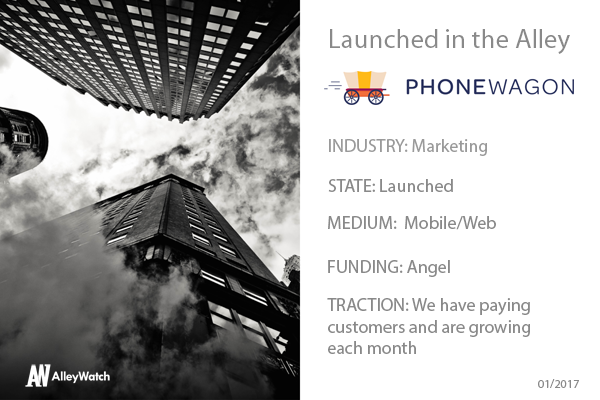For all the time and energy that goes into your company’s advertising, it would be a shame if you were not tracking which ads worked and which failed. The truth is, most companies are not doing this and end up unnecessarily throwing money out the window. This is why PhoneWagon is a must for your small business. With PhoneWagon, you can use your resources smarter and track business leads. The product automatically responds and tracks sales leads connected with the unique phone numbers and covnerts as many customers as your small business can handle.
AlleyWatch chatted with the founder Ryan Shank about the startup and where they plan to go from here.
Tell us about the product or service.
PhoneWagon is beautiful call tracking and analytics software for businesses and the marketing agencies that serve them. PhoneWagon’s customers are able to spend their marketing dollars much more effectively while increasing close rates for the leads that marketing generates.
PhoneWagon allows any business to easily generate and configure unique local phone numbers and place those on each of their different marketing campaigns. Businesses can then view which marketing campaigns are generating phone calls, which ones are not, and allocate their marketing spend accordingly.
PhoneWagon also has powerful customer communication tools that further enable businesses to communicate, engage and close leads generated from marketing. PhoneWagon allows businesses to create custom rules that will automatically respond to missed calls and voicemails before the leads are able to call another business. This game-changing feature is dramatically increasing close rates for PhoneWagon’s customers.
How is it different?
The current market offers very technical, complicated, and difficult-to-use platforms. In addition to a poor user experience, many of these platforms are also very expensive, making it cost prohibitive for small businesses to use and benefit from them. In reality, businesses want to be able to easily get a unique phone number, configure it to work with their marketing campaigns, and begin using that number quickly. PhoneWagon was built from the ground up with a hyper focus on design and user experience, making it dead simple to get up and running. In less than 30 seconds, businesses are able to select a local phone number in whatever area code they choose, forward that number to any phone number, enable call recording and begin using the number. They can easily view the calls, listen to the call recordings and see which campaigns are performing the best. Right now there’s also an expectation that business software should be as beautiful and easy to use as consumer apps and that’s exactly what we’re bringing to call tracking.
Additionally, every call tracking platform on the market today is charging customers outrageous rates for usage (minutes, call forwarding, call recording, call storage, etc.). The downside of this, besides the fact that it’s insanely expensive, is that the customer doesn’t know how much their monthly bill is actually going to be each month. We think this is absolutely crazy and have simplified our pricing to include unlimited usage in all of our plans.
According to 411 Locals, small business owners don’t answer 62% of phone calls, even though BIA/Kelsey data indicates that 66 percent of SMBs consider phone calls the most valuable form of incoming leads. Because of these eye opening statistics, PhoneWagon is the first call tracking software platform to incorporate marketing and sales automation using text messages. If a business doesn’t answer a phone call from one of their tracked marketing campaigns, they can automatically send a text message to the lead before the lead is able to call another business. This instantly engages the customer and begins a dialogue, further improving close rates and marketing spend.

What market are you attacking and how big is it?
Marketing automation and analytics solutions remain in the early adopter phase in this software category. Our goal is to be the preferred and trusted platform for call tracking and ultimately the entire phone system for small businesses. The current market size of call tracking and call analytics software is estimated to be around $1 billion annually. Moving beyond just call tracking and into sales operations expands the addressable market significantly. For example, taking the insights gained through call analytics and applying them towards operational efficiencies and sales processes. A sales rep can increase their close rate by adjusting their script and setting up automated follow-ups and text message responses. By broadening call analytics, the market size now includes spending areas such as inside sales, CRM, and customer support.
What is the business model?
PhoneWagon sells monthly subscriptions based on the number of phone numbers being tracked. While every other company in the market is charging additional fees for usage, PhoneWagon offers a flat rate monthly fee that includes unlimited usage. We also have a starter plan that allows businesses to try out PhoneWagon on a “pay-as-you-go” basis. This is good for freelancers and solo entrepreneurs that want to test and see whether a marketing campaign is generating phone calls or not.
What inspired the business?
I have been involved in lead generation and software for small businesses for his entire career. About 5 years ago, Iwas working for a company that sold leads to small businesses using a pay-per-call model. Most of the time the phone calls would either go unanswered or go to voicemail. I noticed that the leads would typically call the next business on the list if they didn’t get an immediate response.
The problem with this is that the marketing campaign was working but the business wasn’t accepting the leads (by not answering the phone and converting them into a paying customer).
Additionally, by talking with thousands of businesses, I learned that most of them didn’t know which of their marketing campaigns were working. Businesses would spend money on marketing campaigns such as direct mail, adwords, newspaper ads, etc without any idea of how the individual campaigns were performing. All they knew was that they spent X dollars on marketing and generated Y dollars in revenue. If Y was greater than X then they would keep everything as is.
It was through these learnings that we set out to build a tool that enables businesses to see how their marketing is performing and helps them close more leads.
In the move towards digital, how effective is cold calling?
Cold calling can definitely be very effective and scalable for certain products and services. I think the move towards digital has helped give sales teams more insight and betters tools to use to make their cold calling campaigns more effective. Steli Efti, CEO of Close.io, recently wrote a blog post highlighting the importance of clear communication, triggering emotions, and maintaining high energy while on a cold call. If you combine this with account-based sales development, a tactic of strategically hunting targeted accounts rather than just chasing leads blindly, you can definitely make cold calling extremely effective.
What are the milestones that you plan to achieve within six months?
We have already created a product that people love. For the next 6 months we are going to focus on customer development – talking with customers and learning about what they love and don’t love about our product. This will help us shape the product going forward without any guessing.
During this time, we will be creating amazing content to help our customers and potential customers grow their business through improved marketing and sales processes.
We are also targeting to have more than 500 paying customers.
What is the one piece of startup advice that you never got?
You don’t need to raise money to build and launch a startup. I think there’s a huge misconception that you cannot do it without seed funding or venture capital. This is absolutely not the case and I think we should stop glorifying capital raises.
If you could be put in touch with anyone in the New York community who would it be and why?
Michael Bloomberg. He has so many different companies that have achieved enormous success. I would love to pick his brain on how he manages people, builds a brand, motivates his team, builds and maintains relationships, and so much more. I think it’s important to learn from people who have experienced the kind of success you strive for in order to make sure you’re on the right path.
Why did you launch in New York?
New York has incredible talent. After I sold my last company, I realized the value of talent in a startup and I wanted to start my next company in a city that has amazing talent. New York City is that place. The people in New York are doing such interesting things and it’s relatively easy to meet up and grab a coffee or have a brainstorm session. It’s a little more difficult to grab a quick coffee or meet up with someone in other cities like LA where things are more spread out.
Where is your favorite bar in the city for an after work drink?
Bowery Hotel





